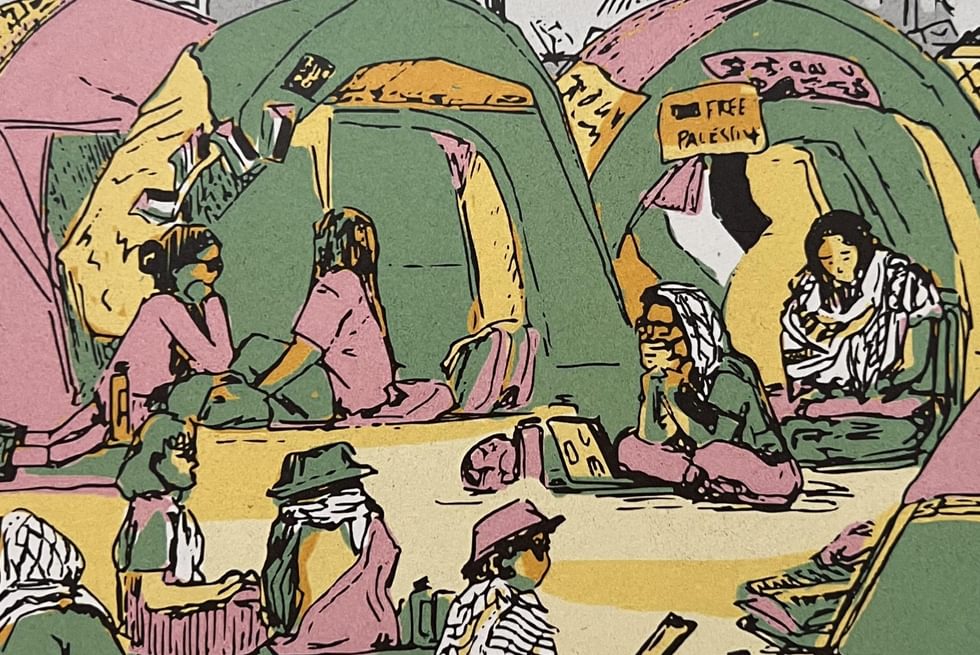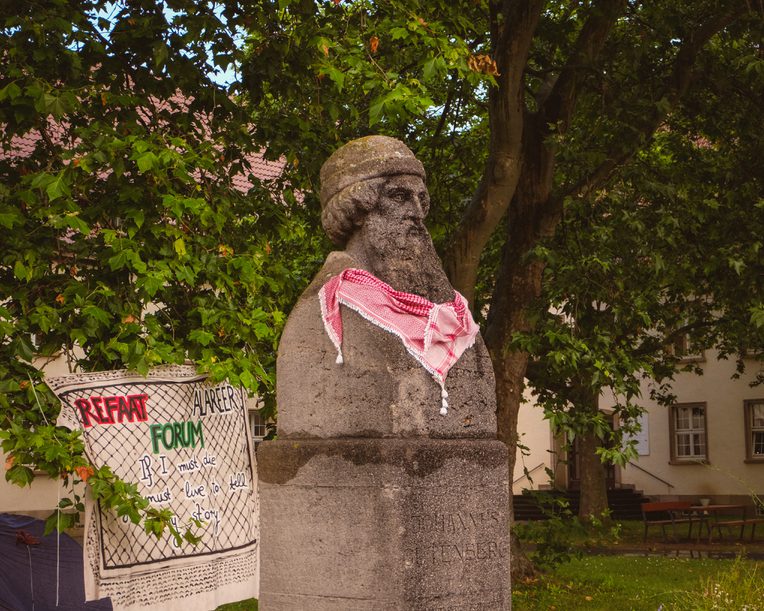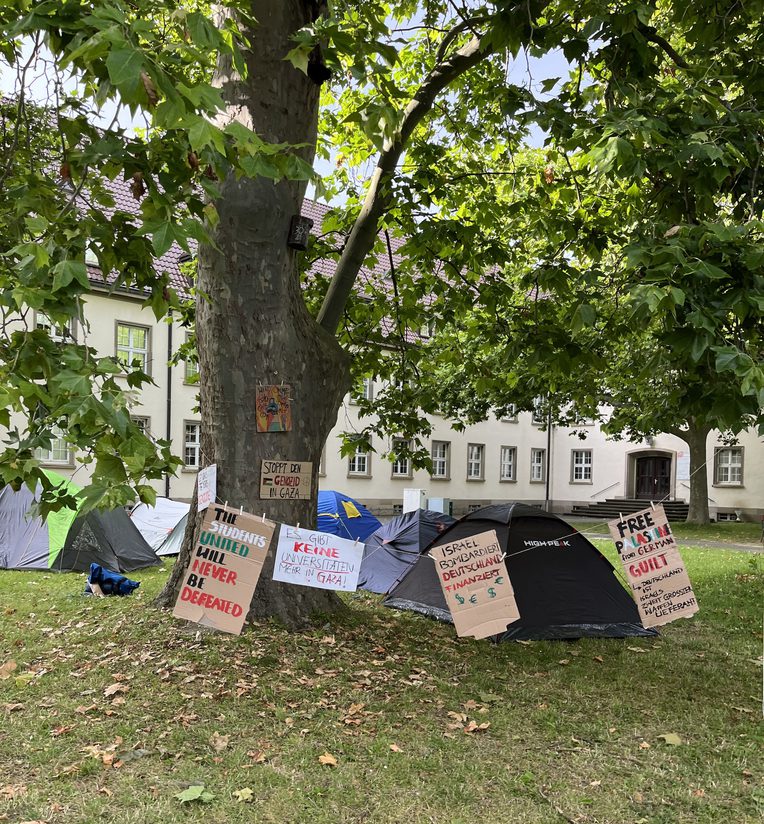Fieldnotes from the Refaat Alareer Forum, Germany: An Encampment in Flux
From the Series: Counter Archives: Fieldnotes from the Encampments
From the Series: Counter Archives: Fieldnotes from the Encampments

This post was collaboratively written by a guest lecturer and students from the Refaat Alareer Forum, members of Students for Palestine (SfP).
In mid-May we announced on Instagram, as the newly-founded Students for Palestine (SfP), that we stood “in solidarity with the Palestinian civilians who are suffering from the extreme violence of the Israeli military as well as the silence of ‘the West’ in this regard” and called on like-minded students. Inspired by other pro-Palestinian encampments in Germany and beyond, we demanded of our university—a public university with about 30,000 students in a mid-sized German city—to disclose and cut ties with arms producers and Israeli institutions complicit in physical and epistemic violence, and to openly condemn arms deliveries and the genocide in Gaza. Because we were aware that student protesters elsewhere had been accused of being anti-Jewish hate stirrers and Hamas supporters, we wanted to avoid any potential grounds for such accusations and stood from the get-go in close dialogue with our university’s security department. After two rallies on campus as well as an information stall and poster campaign at our university’s Open Day in June without any response from the university to our demands, we decided to redirect our activism into holding an encampment from July 3–6, 2024.


We registered our plan—as advised—as a demonstration with the city’s assembly authority and discussed it with our university’s security department. Having done everything by the book we were ready to set up our encampment. On July 2, the city administration informed us that we had not been granted permission to assemble for the night and that we required a separate permission to stay overnight. The university could have allowed us to stay. Instead, they threatened us that if we were to spend the night at the encampment, the university would exercise its property rights (Hausrecht) and have the police evict us. We tried to obtain the city’s approval through an urgent application (Eilantrag) but an assembly authority’s case worker told us in advance that it would be rejected. We applied, nevertheless, but in vain. These last-minute rejections threw a spanner in our works: we had to dismantle most of our encampment every evening and to set it up again the next morning. This bureaucratic repression appears to be a calculated attempt to divert our energy away from pro-Palestine activism.
– SfP


Three months prior—the ongoing war in Gaza was in its sixth month—I took up a guest lectureship at this university. Unlike on UK campuses, with which I was familiar, I did not come across concerted pro-Palestine campus activism: no organized university discussions, charity events or donation appeals that raised awareness about or claimed support for Palestine or Gaza. This silence rang loud. Yet I had anticipated that expressing solidarity with Palestinians was a particularly fraught issue in Germany. Already in late October 2023, an open letter with over 180 academic signatories from German universities had criticized German politics and the public for their “ahistorical understanding of antisemitism and Holocaust remembrance” that “undermines a sensitivity to multidirectional relations of violence and the suffering they produce.”
The German state encodes its responsibility for the Holocaust and its post-World War II commitment to “never again” in a master narrative that associates Germanness with an obligatory guilt about a selective Nazi past: the genocide of Jews rather than accounting for the systematic killing of Sinti, Roma, queer, disabled, etc. (all) victims of the Nazi regime. This master narrative directly feeds into its raison d’état (Staatsräson): an unconditional support of Israel—understood in this logic as the place where Jewish people would find a safe home by securing a Jewish majority ethno-nationalist state.
Chancellor Angela Merkel first declared Israel’s security as Germany’s raison d’état in 2008, and—while vague and not enshrined in law—this Staatsräson has since been conjured as a constitutional duty. In the wake of October 7, the notion of Staatsräson has been mobilized to vehemently attack critics of Israel’s war on Gaza as being antisemitic and unconstitutional, even threatening “large scale deportations.” By February 2024, researchers working in Germany found “their fundamental rights to academic freedom and freedom of expression increasingly restricted” cautioned the German Association of Social and Cultural Anthropology (GASCA), citing, among others, the case of Ghassan Hage.
Following Israel’s military campaign on the Gazan city Rafah on May 7, where 1.4 million Palestinians had sought shelter, students at the Free University (FU) Berlin set up a pro-Palestinian camp on their campus. As with other encampments in Germany and across Europe, the university exercised its property rights and quickly called the police to evict the camp forcefully; arresting 79 protesters that were later released. Berlin-based academics responded with an open letter (which later came to be known as the Berlin statement) in support of protecting students from police violence and for “their right to peacefully protest, including the occupation of university grounds.”
On May 8, the letter was met with “bewilderment” by Bettina Stark-Watzinger, Germany’s education minister. Her disapproval of lecturers who “instead of taking a clear stand against hatred of Israel and Jews, made university occupiers victims and trivialized violence” made headlines in the German media. This intentional misportrayal of peaceful student protest as violent and lecturers’ intentions as fostering antisemitism, backfired: within a few days the letter had more than 1,000 signatures. Soon after, signatories of the Berlin statement from across our campus, including me, swiftly received external and internal emails to either “educate” or criticize us, and consequently we began to communicate with each other behind the scenes and were connected once student protest ignited on our campus.
– Anonymous

As students—some experienced in, many new to political activism—we focused on informing and discussing the war in Gaza with more nuance than the German mainstream media. Contrary to Germany’s raison d’état that prioritizes the safety of Zionist Jews over others and stifles debate through an atmosphere of fear, we envisage our campus as a safe space where open discourse about oppression of any kind is not censored but possible—even encouraged. Such a safe space means safety for all students and in the current context: explicitly safety for Jewish, Arab, and Muslim students that in the last months suffered from antisemitic, racist, and Islamophobic attacks. We see our responsibility not only in reading and thinking about inequalities and injustices—both at home and in the world—but to mobilize and actively fight against these injustices.
Although our encampment was in flux, we succeeded in realizing our three-day program: from offering workshops on learning how to dance Dabke to talks on the origins of Zionism with various speakers, including Palestinians and Jews. The violent eviction of Berlin’s FU encampment and its aftermath set in motion a change on our campus: signatories of the Berlin statement from our university organized behind the scenes to support us by raising funds for legal advice and having internal discussions with university management. Unlike our initial campus activism, the encampment condensed politicization in one prominent place and made it an inevitable issue for everyone on campus. It was this inevitability of criticizing Israel’s state violence and Germany’s complicity that the university and assembly authority sought, and managed, to restrict through bureaucratic trickery. Yet their unfairness made us stronger in our conviction to not let them grind us down but to continue in solidarity with Palestinians and pro-Palestinians activists worldwide to fight for an immediate ceasefire in Gaza and justice in Palestine. Palestine will be free.
– SfP

Thanks to MS, CB, SH, and Kristin Doughty for their valuable feedback; errors are ours.